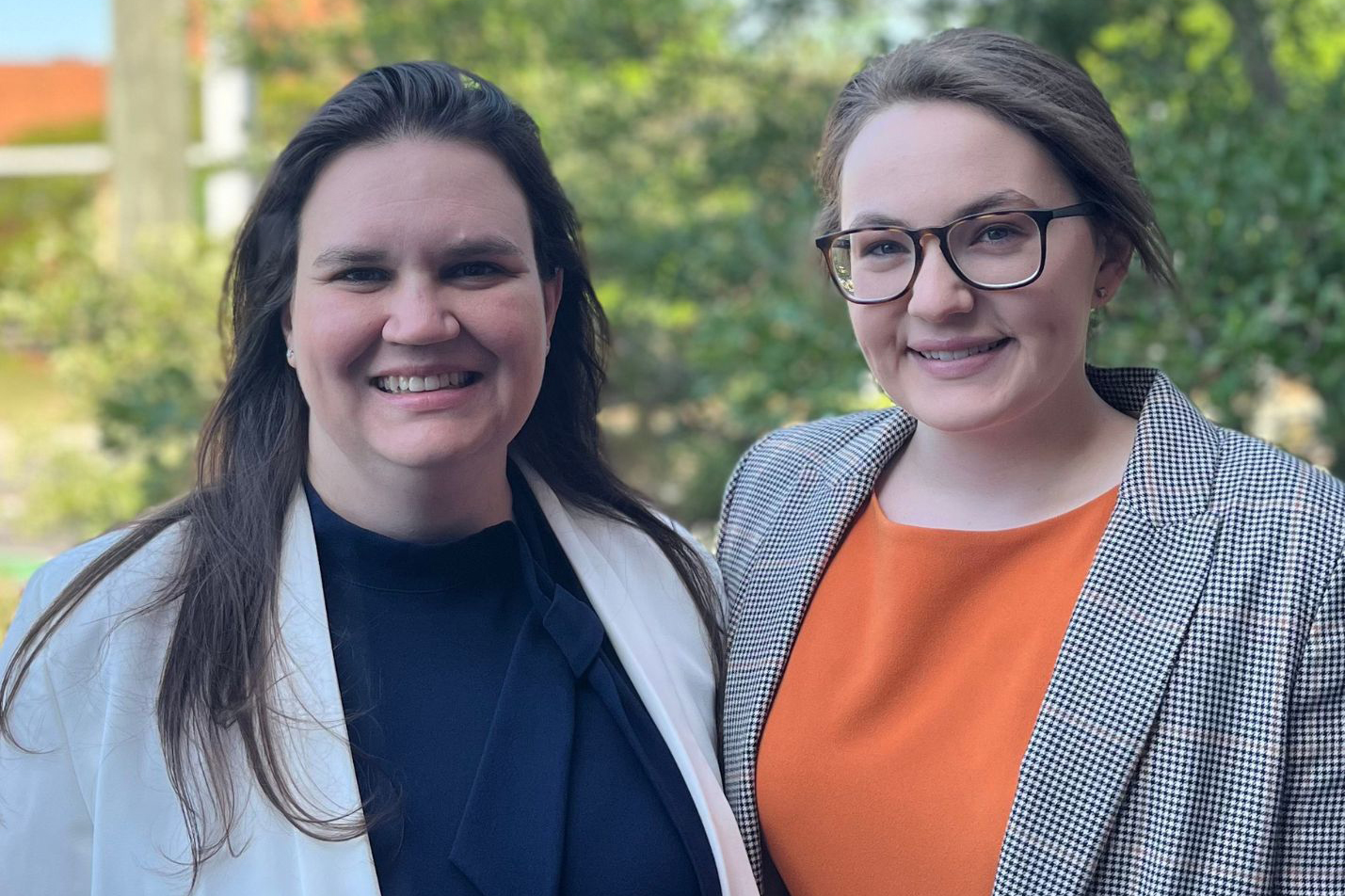
February 16, 2024
By Matt Crouch
AUBURN, Alabama – Recognizing a need to address barriers to medication in their community, Harrison College of Pharmacy students Briley Graves and Lila Parrish are working together on a project to identify and help those in need.
Supporting Graves and Parrish in their project is the Albert Schweitzer Fellowship of Alabama. The pair were named Schweitzer Fellows in the spring and the program is their fellowship project. Alabama Schweitzer Fellows are competitively chosen from students enrolled in graduate and professional schools around the state, who demonstrate a passion for cultivating positive change in Alabama communities where the need is greatest.
Working through the Stanton Road Clinic in Mobile, they are designing and implementing a screening tool based on social determinants of health. In addition to establishing this tool at the clinic, their project aims to connect patients with community resources to aid them in overcoming identified barriers.
“To best assists clinic patients with their barriers to medication access, we knew that we needed a targeted, efficient method to collect information,” said Graves, a native of Decatur, Alabama. “Unfortunately, our research into a screening tool focused on overcoming barriers to access was not as fruitful as we had hoped. Most available tools address medication adherence but do not provide a means to discover the causes behind poor adherence.”
Their tool is a Social Determinants of Health, or SDOH, screening questionnaire specifically focused on identifying barriers to medication access.
“The questions had to be specific enough to identify areas of need amongst the patient populations of Stanton Road Clinic, but also be short enough in question length and quantity to encourage participation,” said Parrish, a native of Valdosta, Georgia.
The Stanton Road Clinic is a resident-run outpatient clinic housed under the USA Health System and is nested in a community identified by the University of South Alabama Center for Healthy Communities as one of 13 “struggling Mobile communities,” providing an ideal setting for their program.
“The main reason I feel like we chose Stanton Road Clinic were because of the variable patient population and the compassionate approach taken by the staff at the clinic,” said Parrish. “A good many of the patients who frequent the clinic are uninsured, underinsured or self-pay patients living below the federal poverty line who are in desperate need of health care services and medication.”
One of the main factors related to positive health outcomes is having access to medication and regularly taking the medication. Common barriers can me health literacy, transportation, physical ability, cost and others. By identifying the barriers to medications to particular patients, Graves and Parrish are able to work alongside community health and social workers who can work with connecting patients to various community resources and programs.
“Failure to take prescribed medications can lead to more emergency exacerbations, further deterioration of current comorbidities, and even new the development of new comorbidities for the patient,” said Parrish. “Being able to connect individuals to these resources will hopefully not only improve individual health, but also lead to lower health care costs in the community with lower absenteeism and higher productivity in the workplace.”
The pair also feel that pharmacists are uniquely positioned within the health care system to assist patients with these barriers and help with medication access.
“I believe that pharmacists occupy a unique space in healthcare where we are known as the ‘medication experts’ by both patients and colleagues,” said Graves. “When a patient has trouble accessing their medication, I want them to feel comfortable sharing this with me and be confident that I have the skills to help them.”
The long-term goal for the project is to offer the screening tool at the Stanton Road Clinic and other clinics within the USA Health system and Mobile area.
“Implementing a project of this nature in Mobile County has been a blessing to my soul,” said Parrish. “I feel a two-part reward from this experience. On one side I get to actively assist in the overall health outcomes of patients, and on the other I am advocating for the field of pharmacy and its future.”
Echoing her partner, Graves is thankful to the Schweitzer Foundation of Alabama and the opportunity to make a difference in their community.
“I was overjoyed to first learn that I was accepted into ASF and then to realize that my project would address a true need for patients in my community,” said Graves. “I am originally from North Alabama, but Mobile has been my home for more than six years. It is important to me to give back to the city and those who live here, and it is even more meaningful for me to serve in a way that aligns with my love of pharmacy.”
----------
Auburn University’s Harrison College of Pharmacy is ranked among the top 25 percent of all pharmacy programs in the United States, according to U.S. News & World Report. Fully accredited by the Accreditation Council for Pharmacy Education (ACPE), the College offers doctoral degrees in pharmacy (Pharm.D.) and pharmaceutical sciences (Ph.D.) while also offering a master’s in pharmaceutical sciences. The College's commitment to world-class scholarship and interdisciplinary research speaks to Auburn's overarching Carnegie R1 designation that places Auburn among the top 100 doctoral research universities in the nation. For more information about the College, please call 334.844.8348 or visit http://pharmacy.auburn.edu.